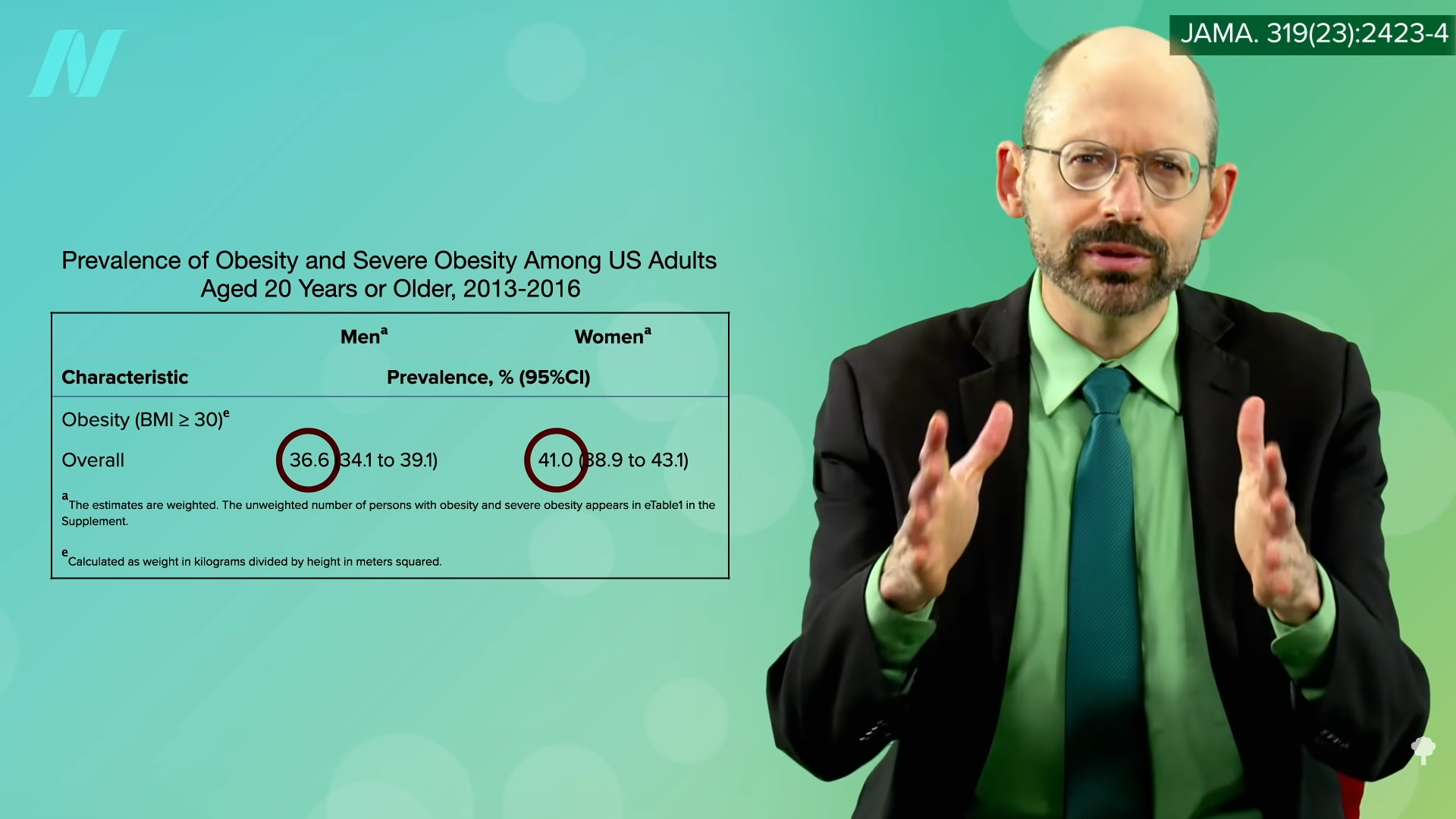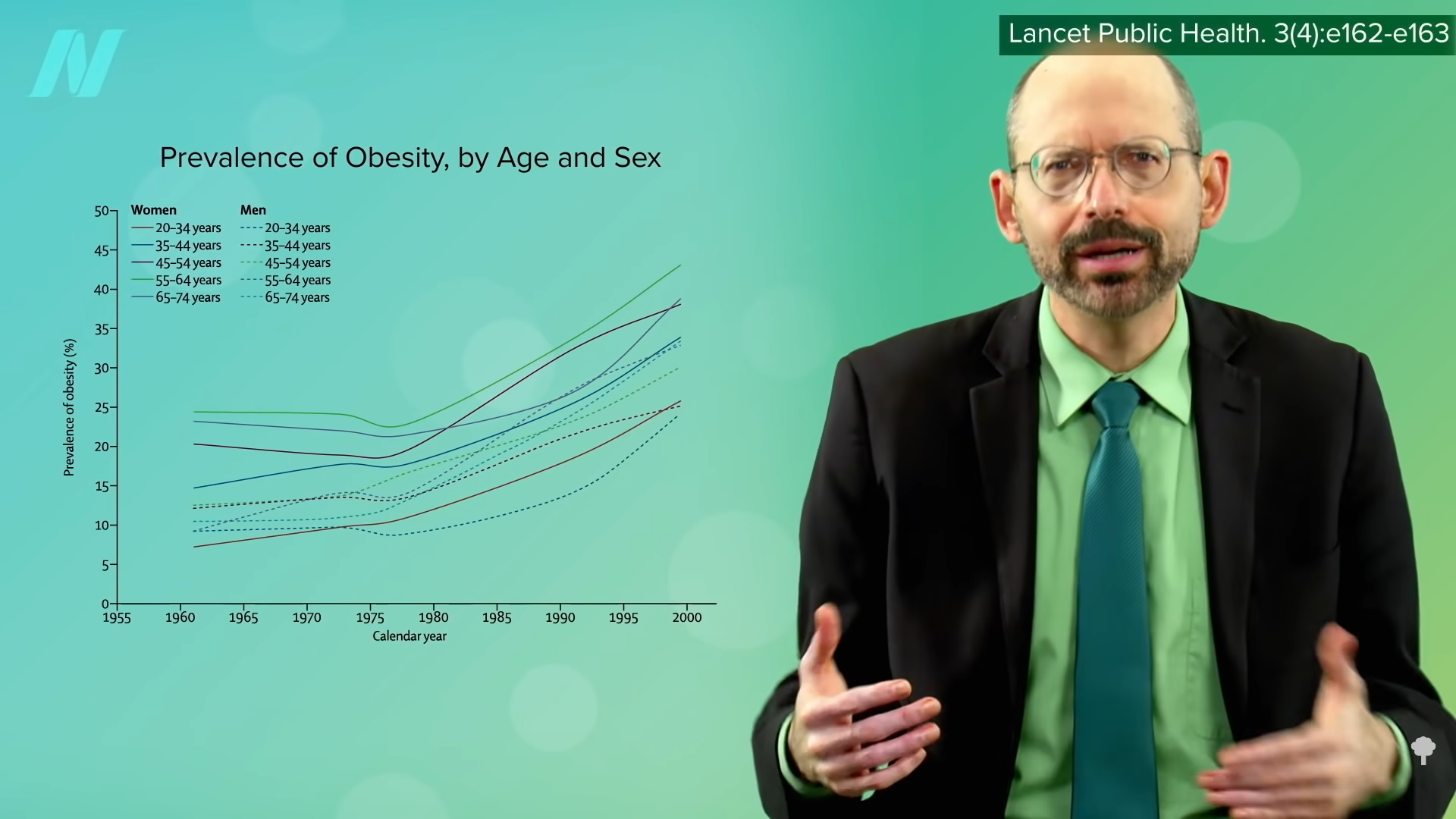The widespread explanations for the reason for the weight problems epidemic put ahead by the meals business and policymakers, resembling inactivity or a scarcity of willpower, should not solely improper, however actively dangerous fallacies.
Weight problems isn’t new, however the weight problems epidemic is. We went from a couple of corpulent kings and queens, like Henry VIII or Louis VI (referred to as Louis le Gros, or “Louis the Fats”), to a pandemic of weight problems, now thought of to be “arguably the gravest and most poorly managed public well being risk of our time.” As you possibly can see under and at 0:34 in my video The Position of Food regimen vs. Train within the Weight problems Epidemic, about 37 % of American males are overweight and 41 % of American ladies, endlessly. Earlier reviews had steered that the rise in weight problems was at the very least slowing down, however even that doesn’t look like the case. Equally, we had thought we had been turning the nook on childhood weight problems “[a]fter 35 years of unremittingly unhealthy information,” however the unhealthy information continues. Childhood and adolescent weight problems charges have continued to rise, now into the fourth decade.

During the last century, weight problems seems to have jumped ten-fold, from about 1 in 30 to now 1 in 3, but it surely wasn’t a gentle rise. As you possibly can see within the graph under and at 1:15 in my video, one thing appears to have occurred across the late Seventies—and never simply in the US, however across the globe. The weight problems pandemic took off at about the identical time within the Seventies and Nineteen Eighties in most high-income nations. The truth that the fast rise “appeared to start nearly concurrently” throughout the industrialized world suggests a standard trigger. What may that set off have been?

Any potential driver must be world and “coincide with the upswing of the epidemic.” So, the change would have needed to have began about 40 years in the past and would have needed to have been in a position to unfold quickly across the globe. Let’s see how all the varied theories stack up. For instance, as you possibly can see under and at 1:55 in my video, some have blamed adjustments in our constructed surroundings and shifts in metropolis planning which have made our communities much less conducive to strolling, biking, and grocery procuring. That doesn’t meet our standards for a reputable trigger, although, as a result of there was no common, simultaneous change in our neighborhoods inside that time-frame.

When researchers surveyed tons of of policymakers, most blamed the weight problems epidemic on a “lack of private motivation.” Do you see how little sense that makes? In the US, for instance, weight problems shot up throughout the complete inhabitants within the late Seventies, as you possibly can see at 2:26 in my video. I concur with the researchers who “imagine it’s implausible that every age, intercourse, and ethnic group, with huge variations in life expertise and attitudes, had a simultaneous decline in willpower associated to wholesome diet or train.” Extra believable than a world change like our characters would be some world change like our lives.

The meals business blames inactivity. “If all shoppers exercised,” mentioned the CEO of PepsiCo, “weight problems wouldn’t exist.” Coca-Cola went a step additional, spending $1.5 million to create the International Vitality Steadiness Community to downplay the function of weight loss program. Leaked emails present the corporate deliberate on utilizing the entrance to “function a ‘weapon’ to ‘change the dialog’ about weight problems in its ‘conflict’ with public well being.
This tactic is so widespread amongst meals and beverage firms that it even has a reputation: “leanwashing.” You’ve heard of greenwashing, the place firms deceptively faux to be environmentally pleasant. Leanwashing is the time period used to explain firms that attempt to place themselves as serving to to resolve the weight problems disaster once they’re as a substitute instantly contributing to it. For instance, the biggest meals firm on the earth, Nestlé, has “rebranded itself because the ‘world’s main diet, well being and wellness firm.” Sure, that Nestlé, makers of Nesquik, Cookie Crisp, and traditionally greater than 100 totally different manufacturers of sweet, together with Butterfinger, Equipment Kat, Goobers, Gobstoppers, Runts, and Nerds. One other one in every of its slogans is “Good Meals, Good Life.” Its Raisinets might have some fruit, however Nestlé appears to me extra Willy Wonka than wellness.
The fixed company drumbeat of overemphasis on bodily inactivity seems to be working. In response to the Harris ballot query, “Which of those do you suppose are the key explanation why weight problems has elevated?,” a “enormous majority of 83% selected lack of train, whereas solely 34% selected extreme calorie consumption.” “Confusion in regards to the impact of train on the power steadiness” has been recognized as some of the widespread misconceptions about weight problems. The scientific neighborhood has “come to a reasonably decisive conclusion” that the components governing calorie consumption extra powerfully have an effect on general calorie steadiness. It’s our quick meals greater than our gradual movement.
“There is appreciable debate within the literature immediately about whether or not bodily exercise has any function by any means within the epidemic of weight problems that has swept the globe because the Nineteen Eighties.” The rise in caloric consumption per particular person is greater than sufficient to clarify the weight problems epidemic in the US and likewise clarify it globally. If something, the extent of bodily exercise over the previous few a long time has gone up barely in each Europe and North America. Satirically, this can be a results of the additional power it takes to maneuver round our heavier our bodies, making it a consequence of the weight problems downside fairly than the trigger.
“Formal train performs a really small function within the complete day by day bodily exercise power expenditure.” Assume how far more bodily work folks used to do within the office, on the farm, and even within the dwelling. It’s not simply the shift in collar shade from blue to white. Rising automation, computerization, mechanization, motorization, and urbanization have all contributed to more and more extra sedentary existence over the past century—and that’s the issue with the idea. The occupational shifts and creation of labor-saving gadgets “have been gradual and largely predated the dramatic improve in weight acquire throughout the developed world previously few a long time.” Washing machines, vacuum cleaners, and the Mannequin T had been all invented earlier than 1910. Certainly, when put to the take a look at utilizing state-of-the-art strategies to measure power in and power out, it was caloric consumption, not bodily exercise, that predicted weight acquire over time.
The widespread false impression that weight problems is usually attributable to lack of train might not simply be a benign fallacy. Private theories of causation seem to impression folks’s weight. Those that blame inadequate train are considerably extra more likely to be chubby than those that implicate a poor weight loss program. Put those that imagine lack of train causes weight problems in a room with chocolate, they usually can covertly be noticed consuming extra sweet. These holding that view could also be totally different in different methods, although. You’ll be able to’t show trigger and impact till you place it to the take a look at. And, certainly, as you possibly can see within the graph under, and at 7:22 in my video, folks randomized to learn an article implicating inactivity went on to eat considerably extra sweets than these studying about analysis that indicated weight loss program. An identical research discovered that these offered with analysis blaming genetics subsequently ate considerably extra cookies. The title of that paper? “An Unintended Method in Which the Fats Gene May Make You Fats.”

Once I sat down to write down How To not Food regimen, I knew this “what triggered the weight problems epidemic” was going to be a giant query I needed to face. Was it inactivity (simply youngsters sitting round enjoying video video games or scrolling on their telephones)? Was it genetic? Was it epigenetic (one thing turning on our fats genes)? Or was it simply the meals? Had been we consuming extra fats rapidly? Extra carbs? Extra processed meals? Or had been we simply consuming extra interval, due to larger serving sizes or extra snacking? Inquiring minds wished to know.
That is the primary in an 11-video sequence to reply this query, which I initially launched in a two-hour webinar in 2020. Take a look at the webinar digital obtain right here. Or, test them out within the associated posts under.










Discussion about this post